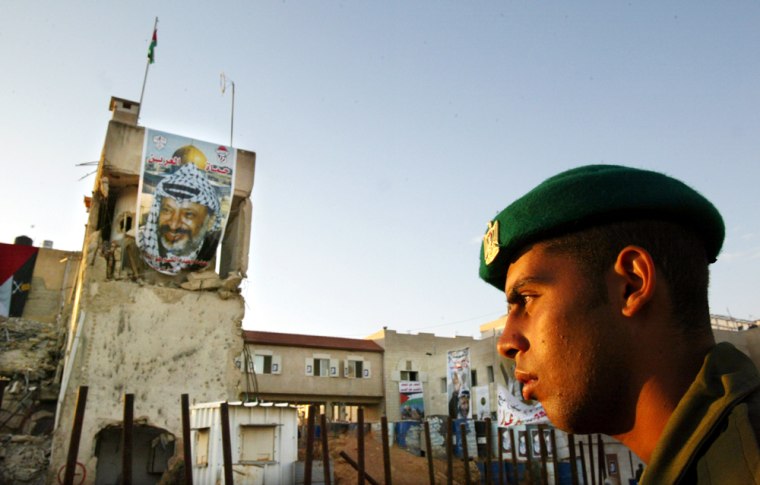Under the cover of darkness, and past a line of armed guards, lay the crumbling walls of Yasser Arafat's Ramallah headquarters. Inside waited Khaled Shaweesh, a Palestinian militant who is among the most wanted men by Israel in the West Bank.
"I am one of the al-Aqsa Brigrade leaders," Shaweesh said recently, referring to the military faction that's part of Arafat's Fatah party. It's one of several groups behind the current intifada, or Palestinian uprising.
Shaweesh added somewhat boastfully, "I am the oldest, and I've been wanted by Israel the longest."
Shaweesh is just one fighter among perhaps thousands in the occupied territories. They wield significant power now as new moderate Palestinian leaders restart peace talks with Israel and the United States, try to stop the violence, and move on to a new era after Arafat's death. But, the militants role in the future of Palestine remains uncertain.
Staying put for now
At times, while Arafat himself was holed up in the compound, he denied that any other wanted men were inside, and Israeli troops maintained their siege. Since Arafat's death, many others have fled, but not Shaweesh.
Israeli officials wouldn't confirm Shaweesh's self-ranking as the militant they’ve wanted the longest. But they do say he's was a senior figure in Arafat's personal security force. They say he planned ambushes, developed explosives and is accused of personally killing at least six Israelis.
Shaweesh said, almost bragging about it, that he was among the fighters who came up with the idea of using female suicide bombers. Women, they reasoned, could more easily get by Israeli security forces.
"To respect Arafat, we must continue the resistance," he vowed. "We will attack the Israelis if they continue attacking us."
He wore faded military fatigues. He sat in small chair with his back supported by the wall. Shaweesh is paralyzed from the waist down. He said he still has nine Israeli bullets inside his body and his arm bears a long jagged scar. He lifted his shirt to show one wound still oozing blood from a recent wound. His room was once was a prison cell, but now it looked more like a dorm room.
"I was a soldier and I am still a soldier," he insisted. "Despite the wounds in my body I will continue fighting."
Shaweesh has been in the compound for two years. He fled here after a gun battle with Israeli troops and Arafat sheltered him along with perhaps 20 other militants.
Power of militants uncertain
Israel, to date, has refrained from storming the Ramallah compound as both sides, with prodding from the international community, take steps to ease tension ahead of expected Palestinian elections on Jan. 9.
"The first challenge is to impose the authority of the new government over these organizations," said Alon Ben David, an Israeli security analyst, referring to the various militant groups.
For now, it's a waiting game.
"Currently, I see Israel showing some restraint, " said Ben David. "They don't want to appear as the ones that are destroying the chances of Abbas forming a stable government."
So Shaweesh remains in hiding, but still free.
Eerie place
He insists he feels safe and protected, but there was very little visible security. It's a bombed out shell of a building with no running water, and little electricity.
Sympathetic neighbors deliver food and water to the people that are still there. In one area, where the exterior wall was blown away, it's possible to look into several floors and rooms of the building. A tub sat in what once was a bathroom.
A few residents there smoked and gazed out into the night, perhaps wondering when yet another Israeli air assault would come. And those here have no illusions another assault will come.
It was an eerie place, with much going on out of sight. It was nothing like the ceremonial and formal site during the day and evening when countless mourners made their way to see Arafat's tomb.
Shaweesh said he plans to support the new government, "because it was created by Arafat."
"If they're going to build on Arafat's achievements, dreams and wishes, we will help the new government do whatever they want to do." Left unclear and vague is exactly what Shaweesh and other hardliners here expect the new government to do.
For that reason, they remain a dangerous wildcard during the transition after Arafat's death, and beyond.
